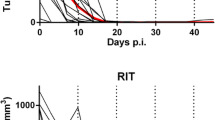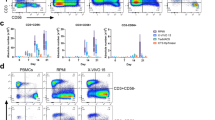Abstract
Objective
To investigate the anti-tumor effects in vitro and in vivo distribution of the human/murine chimeric antibody (D2C).
Methods
The CD71 positive target cells (K562, CEM and SMMC7721) and the effector cells, freshly isolated human PBMC, with the ratio of target cells to effector cells 1∶50, were incubated in various dilutions of D2C antibody (Ab). Antibody dependent cytotoxicity (AD-CC) was tested by using an LDH-release assay. Instead of effector cells, complement was added to the target cells (CEM, SMMC-7721) with various dilutions of D2C Ab. A method of counting death cells was used in complement dependent cytotoxicity (CDC) assay. Tumor localization and distribution of the chimeric antibody (D2C) were observed by labeling the chimeric Ab with radioiodine (131I) and injecting it into nude mice (Balb/c nu/nu) transplanted with human hepatocellular carcinoma cells (SMMC-7721).
Results
A significant ADCC was observed with the increased concentration of the D2C Ab. Cytolysis of CD71-positive target cells by the D2C Ab was found in the presence of fresh rabbit complement. Labeled D2C administered by intraperitoneal as well as tumor regional injection, was visualized by SPECT. The distribution of D2C Ab in murine organs and tissues showed that non-specific binding was lower following tumor regional administration than when the antibody was administered by an intraperitoneal injection. The human/murine chimeric antibody (D2C) has in vitro anti-tumor effects and can exert its effects in specific tumor localization. Its distribution and local effects in vivo can be detected by radioimmunoimaging.
Conclusion
CD71 human/murine chimeric antibody showed marked killing of tumor cells in vitro, and specific recognition and high affinity binding to tumor tissue in vivo
Similar content being viewed by others
References
Crillo-Lopez AJ, White CA, Varns C, et al. Overview of the clinical development of rituximab: first monoclonal antibody approved for the treatment of lymphoma. Semin Oncol, 1999, 26(5 Suppl 14): 66–73.
Goldenberg MM. Trastuzumab, a recombinant DNA-derived humanized monoclonal antibody, a novel agent for the treatment of metastatic breast cancer. Clin Ther, 1999, 21(2): 309–318.
Thorson JA, Smith KM, Gomez F, et al. Role of iron in T cell activation: TH1 clones differ from TH2 clones in their sensitivity to inhibition of DNA synthesis caused by IgG Mabs against the transferrin receptor and the iron chelator deferoxamine. Cell Immunol, 1991, 134(1): 126–137.
Kemp JD. Iron deprivation and cancer: a view beginning with studies of monoclonal antibodies against the transferrin receptor. Histol Histopathol, 1997, 12(1): 291–296.
Kovar J, Stunz LL, Stewart BC, et al. Direct evidence that iron deprivation induces apoptosis in murine lymphoma 38C13. Pathobiology, 1997, 65(2): 61–68.
Weiner LM. An overview of monoclonal antibody therapy of cancer. Semin Oncol, 1999, 26(4 Suppl 12): 41–50.
Vandevyver C, Steukers M, Lambrechts J, et al. Development and functional characterization of a murine/human chimeric antibody with specificity for the human interleukin-2 receptor. Mol Immunol, 1993, 30(10): 865–876.
Sahagan BG, Dorai H, Saltzgaber-Muller J, et al. A genetically engineered murine/human chimeric antibody retains specificity for human tumor-associated antigen. J Immunol, 1986, 137(3): 1066–1074.
Author information
Authors and Affiliations
Additional information
This project was supported by grant from the National Sciences Foundation of China (No. 39970693).
Rights and permissions
About this article
Cite this article
Yang, D., Wang, S., Zhu, H. et al. The anti-tumor effects of an anti-CD71 chimeric antibody in vitro and its distribution in a tumor xenograft model. Chin. -Ger. J. Clin. Oncol. 1, 109–112 (2002). https://doi.org/10.1007/BF02851748
Received:
Issue Date:
DOI: https://doi.org/10.1007/BF02851748




